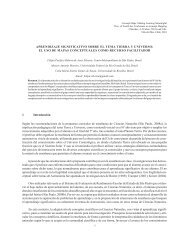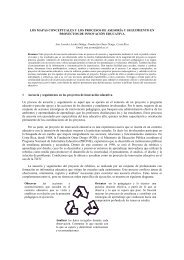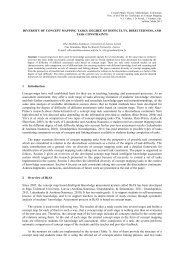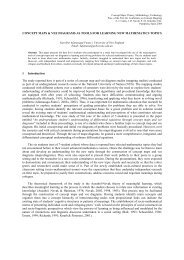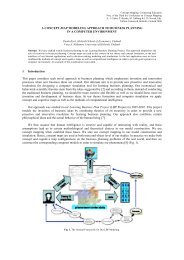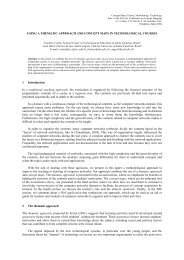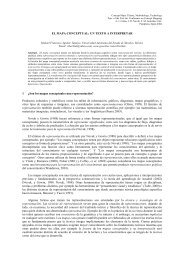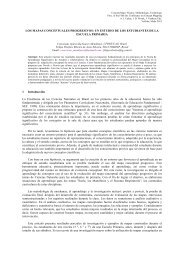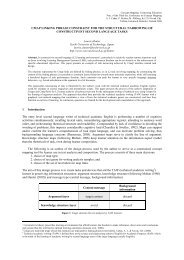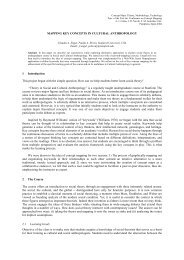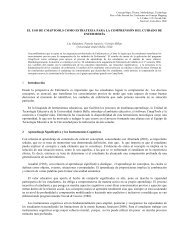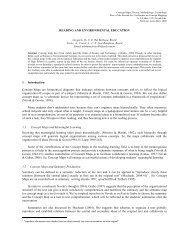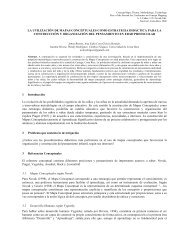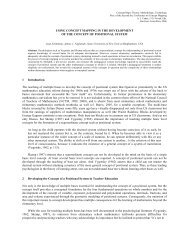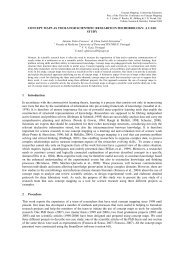A Proposal to Refine Concept Mapping for Effective Science Learning
A Proposal to Refine Concept Mapping for Effective Science Learning
A Proposal to Refine Concept Mapping for Effective Science Learning
Create successful ePaper yourself
Turn your PDF publications into a flip-book with our unique Google optimized e-Paper software.
let us focus on what we can do here. Though we may think that there can be innumerable number of linking words,<br />
if we look closely in<strong>to</strong> any expert domain in any science, we realize that the number of kinds of linking words is<br />
limited, and does not increase as the knowledge advances. Let us call the kinds of linking words as relation types.<br />
Take any large concept map of any domain, and take a measure of the number of relation types used <strong>to</strong> re-represent<br />
the knowledge. We hypothesize that the number reaches very quickly a constant figure <strong>for</strong> each domain of<br />
knowledge and does not increase any further. Our hypothesis has already some support from the preliminary<br />
evidences of Fisher's work. A biology network created by a team revealed 67 relations used <strong>to</strong> link about 2,300<br />
concepts (Fisher, 1990, pg. 1003). Our ongoing research further substantiates our hypothesis, and we will report the<br />
results on another occasion. In a study conducted by us, a chapter from the Class VIII science textbook was rerepresented<br />
as a concept map by carefully choosing accurate relation types. We found that the entire knowledge of<br />
the chapter needed only 6 relation types in a network of about 70 propositions (Kharatmal, 2006). If our argument<br />
that experts tend <strong>to</strong> use less number of relation types has any weight, then while using concept mapping technique in<br />
science education we should make a special ef<strong>for</strong>t <strong>to</strong> inculcate discipline in choosing the right kind of relation types.<br />
It may not be inappropriate <strong>to</strong> give a higher score <strong>for</strong> choosing the right kind of relation type while making the<br />
maps. If accurate use of relation type is a good index of expertize and restructuring of knowledge, every valid<br />
relation type should be given a higher score. We are not proposing a specific value <strong>for</strong> the score yet, and may be<br />
decided by experts in knowledge mensuration. Our purpose is <strong>to</strong> initiate a discussion.<br />
Figure 4. <strong>Concept</strong> maps on living organisms drawn by S1 and S2.<br />
By taking care of appropriate relation types, the problem reported above on the hierarchy also gets resolved.<br />
Consider the maps drawn in Figure 4. By the traditional method the map drawn by S1 has three levels of hierarchy.<br />
However, the same map is re-represented by us as S2 using our proposed discipline. We see two distinctly valid<br />
hierarchies, one <strong>for</strong> the relation type 'consists of' which has two levels, and the other using the relation type 'includes'<br />
which has three levels. Clearly the <strong>for</strong>mer one is a hierarchy of part-whole relation, and the latter is of class-subclass<br />
relation. This rigor, we think, is necessary <strong>for</strong> science education, and reflects the restructuring that takes place while<br />
becoming an expert.<br />
In this paper we have identified certain anomalies in the existing concept mapping and scoring methodology,<br />
particularly keeping in mind the use of concept mapping <strong>for</strong> science education. We have attempted <strong>to</strong> show that the<br />
traditional rubric is inefficient in capturing and comparing the knowledge restructuring during the transition from the<br />
novice <strong>to</strong> an expert. We have proposed that if concept mapping methodology is refined by attending <strong>to</strong> the problems<br />
and by following a few suggestions made in this paper, it can become a more effective <strong>to</strong>ol in studying the structure<br />
and dynamics of knowledge.<br />
4 References<br />
Ausubel, D., Novak, J., and Hanesian, H. (1978). Educational Psychology: A Cognitive View. New York: Holt,<br />
Rinehart and Wins<strong>to</strong>n.<br />
Arnaudin, M. A., Mintzes, J. J., Dunn, C. S., & Shafer, T. H. (1984). <strong>Concept</strong> mapping in college science teaching.<br />
Journal of College <strong>Science</strong> Teaching, 117—121.



